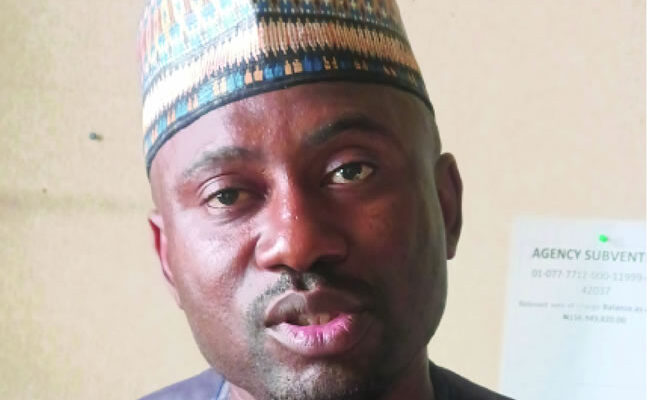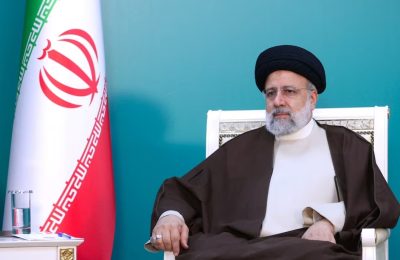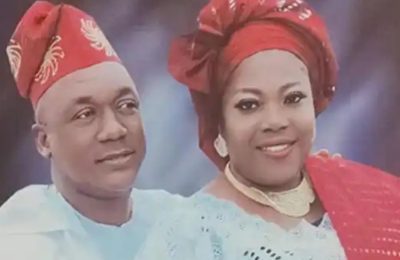Mr Yusuf Majolagbe, Head, Public Facilities Management Department, Lagos State Wastewater Management Office is the fifth Chairman of the Nigerian Institution of Environmental Engineers, Lagos State Chapter. In this interview with DAYO AYEYEMI, he speaks passionately about the need to embrace circular economy in resources utilisation to promote clean environment and healthy living.Majolagbereeled out his agenda for the institution, while emphasising the need for aggressive awareness, stakeholders’ engagement and collaboration with government, professional bodies and the private sector of to achieve sustainable environment.
How did you see your inauguration as the Chairman of the Nigerian Institution of Environmental Engineers, Lagos State Chapter?

Firstly, I see it as a challenge. We do have many problems in Lagos and the state government is doing its best to ensure that we have a sustainable environment. But the government cannot do it alone, it has to be in collaboration with the professional bodies, private sector and every member of the society. They have to contribute to it. So, I see our professional body as the fulcrum to bring together all these stakeholders in order to have the best sustainable environment. This is where I come in to ensure that I am able to bring all environmental engineers together. As environmental engineers, we have among our members the mechanical, chemical and civil engineers. It is a big challenge to bring all these experts together so that they can think in one direction to save our planet and society.
The main theme of the lecture during your inauguration centered on circular economy. Can you tell us more about this?

Circular economy is a terminology to make us have a paradigm shift from a lineal economy into a circular economy. What I mean is that we want to keep our resource utilisation in closed doors. That means we do not want the shelf life of whatever we produce to end so soon and end up in dumpsites. We want to be able to reuse them, and the essence of reusing them is to be able to reduce the cost of production, that is one. Two, we want to increase innovation; that means we must be able to design this waste; we must be able to design our pollution for better. Thirdly, we want to reduce the greenhouse gas effects. You know the climate change is affecting us. Many people don’t know that it is indirectly causing the problems that we have today and if we don’t manage, if those pet bottles will end up in the drains and block our drainages, they will have a direct effect on us. Also, we need to save our environment. If we are able to do this circular economy, that means we are able to convert the use of waste materials into something useful. At least, we will save our environment from all forms of pollution. We need to be enthusiastic about this. In America, there is young lady called Lawren Singer. She is an environmental activist and, over 11 years, she has been able to do a lot public treaties. She is a social media influencer when it comes to zero waste. In four years, she was able to generate six pounds of waste. That means a jar of waste in one year; that means everything she uses is being converted into useful products.

Nigeria is a country that has a large textile industry. What that means is that, we used all our cloths. We know the cloths that we just throw away and push to the dustbins, all those cloths can be taken back to the textile industry and turn to some useful things.
What programmes are you put in place to create awareness about circular economy?
The first thing is that, when we are doing awareness, we need to carry all the stakeholders along. We had an event at the Lagos State Water Regulatory Commission two weeks ago where all the stakeholders were there. It has to do with wastewater. The Permanent Secretary, Lagos State Ministry of Health was there because if wastewater is not properly managed and recycled, then it’s going to give major health issues. So if the permanent secretary is there, he will be able to tell us the main danger if we don’t manage our wastewater properly. Soif most stakeholders are involved, the message will be completed and the delivery will goes well. We need to get all that to the people. We need to involve all the community leaders and royal fathers. When we are doing some of the publicity, we must go to the grassroot and ensure that the information is passed to them for them to have a say in the environment. We must tell them the implications on the health issues.
How do you handle this going by the huge human population in Lagos?
I will drop two principles for us. The first one is the Extended Producer’s Responsibility. The second one is the Polluter Pay Principle. Let’s look at the extended producer’s responsibility. In those days, the bottling companies, before you buy something from them you need to bring a crate of bottles. What that means is that the waste responsibility to be generated from those bottles flying about, just like we have the pet bottles, go back to the manufacturers. Which means, those organisations took responsibility. So at the Federal level, this policy is still voluntary, but I can say authoritatively that, at the Lagos state’s level, it is been made mandatory. So that is left for us to enforce it that all producers have this policy at the back of their mind. That is about the extended producer’s responsibility. The second principle is the polluter’s pay principle – What this means is that all those that produced something and generate must firstly include the cost of recycling into their cost of production. If the cost of producing a soft drink is N100.00, then they need to add N10.00, N20.00 or more for the recycling of the waste. Once that is done, they would have outsourced the recycling to the experts, who will come and get the percentage to go and recycle. So what those outsourced recycling companies do is that they go for all products across Lagos state, they harvest the waste and begin to recycle them.
Are we do much in this regards now?
Yes. What we need to do is to create many of stakeholders’ engagements and make sure the government ensure the law is enforced, sustained and implemented. Now, from my own side as an environmental engineer, what we do is that, there are some small equipment that we can fabricate. We have one of our past national chairmen that does that very well. It is called mini-crusher. We need to start producing many of them as environmental engineers. We need to design them and that is why the electrical and mechanical engineers need to come together to produce them. Everybody can even be mini recyclers in the home. You can collect all the pet bottles, even if they fill a room; we have a mini crusher to crush them. The waste becomes meaningful and easier to transport to the next facility that will complete the recycling process.
What is your agenda for NAEE, Lagos chapter?
My major agenda has to do with awareness. We are going to do a lot of awareness, programmes and stakeholders ‘engagements in collaboration with the government. One of it that we have started is the domestication of the National Building Code. The National Building Code has been ongoing at the Federal level. But you know that anything that started in Nigeria that has not taken shape in Lagos, then we are not yet serious about it due to the high population of Lagos State and being the largest economy in Africa. We want to engage the stakeholders like the Lagos State Environmental Protection Agency and others. We still have the challenges of noise pollution, effluent discharge into water bodies and air pollution. We also have Lagos State Wastewater Management office. Over 90 per cent of people in Lagos still use septic tanks, but we know that Lagos is a coastal city; there are some portions in Lagos that those septic tanks cannot work.
There must be an enlightenment in Victoria Island, Ikoyi, and Lekki axis about sewage treatment plant. We will be having several technical sessions to put together all the standards that relate to the environment. We are going to involve all the experts. Some of these standards have been put in the building codes. We need to generate standards for septic tank; we need to generate water quality for effluent treatment plant and all of that. As we speak, it is a huge challenge in Lagos. Most of the water in Lagos is saline water. I mean salt-water intrusion. We need to think differently, we need to conserve, reuse and regenerate. The challenge is huge and the only way to go about it is stakeholders’ engagement by creating more awareness.
READ ALSO FROM NIGERIAN TRIBUNE








